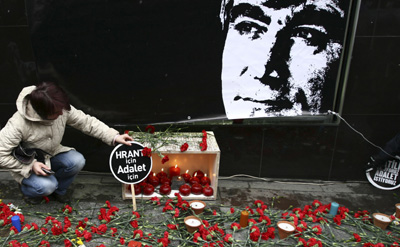Turkish journalists are hoping a ruling next week by the European Court of Human Rights will bring justice for slain editor Hrant Dink at least one step closer. Prosecutors have dragged their feet in this case, which goes to the heart of the debate over Turkish identity.
Dink, a prominent Armenian-Turkish writer and editor, was shot to death outside the Istanbul offices of his newspaper Agos on January 19, 2007. He angered the nationalist and military establishment with his articles challenging the official history of modern Turkey’s founder, Mustafa Kemal Ataturk, and of Ottoman Turkey’s role in the World War I killings of Armenians. He had received numerous death threats over the years.
When I interviewed him in his office in 2006, Dink was pleased with his role as an iconoclast and determined to fight the many prosecutions brought against him for his writings, including a 2006 conviction for “denigrating Turkish identity” under the infamous Article 301 of the penal code. Dink himself turned to the Strasbourg-based European Court to challenge that verdict. After his murder, Dink’s family petitioned the Court under Article 2 of the European Convention on Human Rights, which asserts the right to life. The family claimed in a civil suit that the Turkish state had failed in its obligation to protect Dink even after the death threats, and had also failed to mount an effective investigation and prosecution of those charged in his murder, Deniz Tuna, one of the Dink family lawyers, told CPJ.
Citing sources close to the European Court, several Turkish news outlets have reported that the ruling, expected on September 14, will find in favor of the Dink family claim. Dink family lawyers and European Court sources declined to comment on the reports.
Journalist Kemal Goktas of Vatan newspaper, which carried a report on the expected decision, said the Court would find against Turkey on two counts–violation of Dink’s right to life and violation of his right to free speech under the “denigrating Turkishness” conviction. Such a ruling would allow the family to seek compensation. But it would also be deeply embarrassing to Turkey, which has come under pressure to reform its media freedom laws as part of its efforts to join the European Union.
Goktas, who has followed the Dink murder case closely, told CPJ that the Turkish justice system had little to show for the trial of Dink’s alleged killers which has been going on for three and a half years. He said he saw little will on the part of the Turkish authorities to get to the bottom of the killing.
Prime Minister Recep Tayyip Erdogan has condemned Dink’s murder as an attack against Turkey’s unity and vowed to bring the perpetrators to justice. But many journalists believe that the so-called “deep state”–the shadowy network of nationalists and military that still influence Turkish politics behind the scenes–is responsible for the lack of progress in the Dink murder.
Shortly after Dink was shot, police arrested the alleged gunman, 17-year-old Ogün Samast, who reportedly confessed to the crime. He is still in custody, along with ultranationalists Yasin Hayal, the alleged mastermind, and Erhan Tuncel, according to Vatan‘s Goktas. Tuncel, a native of Trabzon, Samast’s hometown on the Black Sea, is also accused of inciting Samast to carry out the killing.
